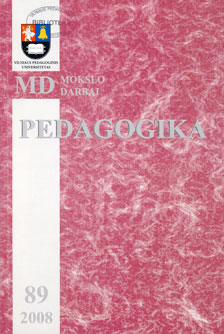Ugdymo paradigmų kaita XX-XXI a. Sandūroje - unikalus Lietuvos švietimo istorijos reiškinys
The shift in the educational paradigm of the late 20th and the early 21st centuries is a unique phenomenon in the history of Lithuanian education
Author(s): Loreta Žadeikaitė, Ramutė BruzgelevičienėSubject(s): Education
Published by: Vytauto Didžiojo Universitetas
Summary/Abstract: The issues of the shift in the educational paradigm in the course of educational reforms of national scale performed in Lithuania are discussed in the article. Key words: educational reforms, classical educational paradigm, paradigm of free education, humanistic education. There have been two educational reforms of prevailing and national scale in Lithuania. Those were the proceedings of educational commission of the Lithuanian and polish state in the late 18th and the early 19th centuries and the development of Lithuanian education during the interwar period in 1918-1940. The article concentrates on the aspects of educational paradigms of these reforms, such as how was the purpose of educational system perceived, what goals of education were raised, what image of educated personality was formulated as well as what educational conception prevailed. The educational reform of the late 20th and the early 21st centuries is analyzed on the grounds of the same concepts. The theme of the shift in educational paradigms is nowadays widely discussed among the Lithuanian researchers of educology in various aspects. However, the problematic question is whether researchers of educol-ogy and other sciences, as well as the educational community and society in general have really perceived the real scale and historical importance of the unique work that was started in 1988, when the first independent conception of the lithuanian education was created, and that was developed into the educational conception of independent state of lithuania in 1992. Therefore, the author’s object of investigation is this particular aspect of the historical uniqueness of the shift in educational paradigms implemented by the Lithuanian educational reform. The purpose of investigation: to uphold the relevance of the uniqueness of the shift in educational paradigms implemented by the Lithuanian educational reform. The methods of investigation: analyses of scientific literature and documentary sources, as well as comparative analyses. The conception of paradigm is based on that offered by t. S. Kuhn in 1962. A paradigm is defined as a historically developed system of attitudes towards certain phenomena, in this case - education, which builds up on the whole of respective theoretical and methodological prerequisites. It is assumed that educational paradigms are defined by peculiarity of certain historical period. The conclusions drawn in the article are as follows: There have been no significant periods that would have led to creation of democracy in the Lithuanian history until the late 20th and the early 21 centuries. Therefore none of the previous educational reforms of prevailing or national nature, such as the proceedings of educational commission in the late 18th and the early 19th centuries or the development of Lithuanian education during the interwar period in 1918-1940, are to be related with the shift in educational paradigms implicitly...
Journal: Pedagogika
- Issue Year: 2008
- Issue No: 89
- Page Range: 18-28
- Page Count: 11
- Language: Lithuanian

